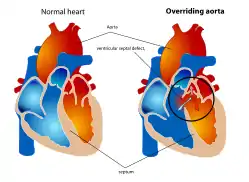Overriding aorta
An overriding aorta is a congenital heart defect where the aorta is positioned directly over a ventricular septal defect (VSD), instead of over the left ventricle.[1] The result is that the aorta receives some blood from the right ventricle, causing mixing of oxygenated and deoxygenated blood, and thereby reducing the amount of oxygen delivered to the tissues.
| Overriding aorta | |
|---|---|
 | |
| Diagram of a healthy heart and one suffering from overriding aorta | |
| Specialty | Cardiac surgery |
It is one of the four findings in the classic tetralogy of Fallot. The other three findings are right ventricular outflow tract (RVOT) obstruction (most often subpulmonary stenosis), right ventricular hypertrophy (RVH), and ventricular septal defect (VSD).
References
- "Overriding aorta (Concept Id: C0265886) - MedGen - NCBI". www.ncbi.nlm.nih.gov. Retrieved 31 October 2021.
External links
This article is issued from Wikipedia. The text is licensed under Creative Commons - Attribution - Sharealike. Additional terms may apply for the media files.